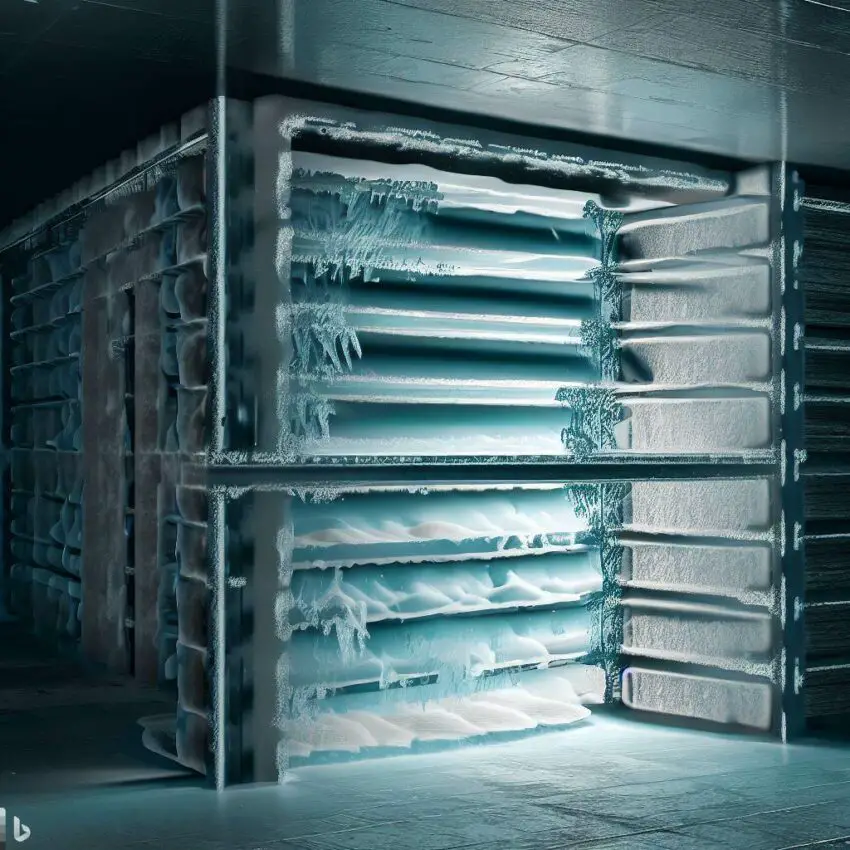Cold storage insulation panels are a vital component in maintaining the temperature of perishable goods during transportation and storage. These specialized panels are designed to provide optimal insulation, ensuring that products remain at their desired temperature without any risk of spoilage or damage. With the increasing demand for cold storage solutions across various industries, the need for high-quality insulation panels has become more critical than ever.
The purpose of this article is to provide an in-depth analysis of cold storage insulation panels, including their properties, applications, and benefits. As a leading expert in the field of cold storage insulation technology, I will share my knowledge and experience to help readers understand the importance of these panels and why they are essential for any business that deals with perishable goods. From food production to pharmaceuticals, these panels play a crucial role in ensuring that products stay fresh and safe throughout every stage of the supply chain.
The Importance Of Temperature Control In Cold Storage
 Temperature control is an essential factor in cold storage facilities that aims to maintain food safety and quality. The lack of proper temperature management can cause spoilage, bacterial growth, and other harmful effects on food products. Cold storage insulation panels play a crucial role in achieving this goal by providing thermal insulation and maintaining the desired temperature range.
Temperature control is an essential factor in cold storage facilities that aims to maintain food safety and quality. The lack of proper temperature management can cause spoilage, bacterial growth, and other harmful effects on food products. Cold storage insulation panels play a crucial role in achieving this goal by providing thermal insulation and maintaining the desired temperature range.
Energy efficiency is another significant advantage of using cold storage insulation panels. These panels help reduce energy consumption by minimizing heat transfer between the interior and exterior environments. This translates to lower operating costs and reduced carbon footprint while ensuring optimal temperature conditions for stored food products.
The importance of temperature control in cold storage cannot be overstated as it helps prevent foodborne illness outbreaks caused by improper storage conditions. Temperature abuse or fluctuation can result in pathogenic bacteria growth, which may pose severe health risks to consumers. With the use of cold storage insulation panels, operators can ensure that the food products remain safe for consumption throughout their shelf life.
In summary, cold storage insulation panels are critical components in maintaining food safety and quality while reducing energy consumption in cold storage facilities. Operators must prioritize temperature control as it plays a vital role in preventing foodborne illnesses caused by improper storage conditions. The next section will discuss the properties of cold storage insulation panels that make them suitable for use in such applications.
Properties Of Cold Storage Insulation Panels
Maintaining temperature control in cold storage is crucial to preserving the quality and safety of stored goods. As such, choosing the right insulation for cold storage is a critical decision that can impact the efficiency and effectiveness of temperature control. Cold storage insulation panels are an ideal solution for this purpose due to their high thermal resistance, durability, and ease of installation.
One of the most significant advantages of cold storage insulation panels is their easy installation process. These panels are designed to be lightweight and modular, making them quick and straightforward to install. Additionally, they require minimal preparation before installation, reducing downtime during installation. This feature makes them ideal for use in facilities where time is a crucial factor.
Maintenance requirements are also essential when considering insulation solutions for cold storage. Cold storage insulation panels require minimal maintenance compared to other forms of insulation. They are made from durable materials that can withstand harsh environments, including moisture and extreme temperatures. Additionally, these panels have a long lifespan, reducing the need for frequent replacements or repairs.
In summary, cold storage insulation panels offer several benefits over other forms of insulation solutions for cold storage applications. Their simple installation process and low maintenance requirements make them an attractive option for businesses looking to optimize their cold storage systems’ performance while minimizing costs. In the next section, we will explore some common applications of these panels in various industries.
Applications Of Cold Storage Insulation Panels
The application of cold storage insulation panels is extensive and diverse. These panels can be used in various industries, including food processing, pharmaceuticals, chemical manufacturing, and many others. The primary function of these panels is to maintain a consistent temperature within a cold storage unit. This means that the stored products will remain at the desired temperature, thus ensuring their quality and safety for consumption.
The installation process of cold storage insulation panels requires expertise and precision. It involves the use of specialized equipment and techniques to ensure that the panels are installed correctly. The first step in the installation process is to assess the specific requirements of the cold storage unit. This includes determining the size of the unit, its location, and any other special needs or considerations. Once this has been done, it is essential to select high-quality insulation materials that are suitable for the application.
To ensure optimal performance and longevity of cold storage insulation panels, regular maintenance is required. Proper maintenance helps prevent damage to the panels, which can compromise their functionality. Some maintenance tips include regular inspection to identify any signs of wear or damage, cleaning with appropriate materials, and prompt repairs when necessary. Additionally, it is essential to maintain proper temperature control within the cold storage unit by regularly monitoring and adjusting the system settings as needed.
In summary, cold storage insulation panels are critical components in maintaining a consistent temperature within a cold storage unit. Their applications are widespread across various industries due to their effectiveness in preserving product quality and safety for consumption. The installation process requires specialized knowledge and precision while regular maintenance ensures optimal panel performance over time. By following these guidelines for installation and maintenance practices, you can significantly extend your panel’s lifespan while maximizing its efficiency.
Benefits Of Using Cold Storage Insulation Panels
Having discussed the various applications of cold storage insulation panels, it is important to highlight their benefits. One of the primary benefits is energy efficiency. Cold storage insulation panels effectively reduce the amount of energy required to maintain a low-temperature environment. This results in lower electricity bills and reduced carbon emissions, making it an environmentally friendly choice.
In addition to being energy efficient, cold storage insulation panels also provide cost savings. By reducing the amount of energy required for cooling, businesses can save significantly on their electricity bills. Furthermore, installation costs are relatively low compared to other forms of insulation. The long-term savings make cold storage insulation panels a cost-effective investment for businesses in the food and beverage industry.
Choosing the right cold storage insulation panel for your business requires careful consideration of several factors. It is essential to evaluate specific needs such as temperature requirements and size restrictions before selecting a particular type of panel. Additionally, it is important to choose a reputable manufacturer that uses high-quality materials and employs skilled technicians during installation.
Ultimately, investing in cold storage insulation panels can have significant benefits for businesses in terms of energy efficiency and cost savings. However, choosing the right type of panel is critical for achieving these benefits. Businesses must carefully evaluate their specific needs and select a reputable manufacturer to ensure they reap the rewards of this investment over the long term.
Choosing The Right Cold Storage Insulation Panel For Your Business
 Choosing the right cold storage insulation panel for your business is a crucial decision that can affect the efficiency and effectiveness of your storage facility. With so many different types of insulation panels available in the market, it can be overwhelming to choose the most appropriate one for your specific needs. To make an informed decision, it is essential to consider various factors such as temperature requirements, size and layout of your storage area, and budget.
Choosing the right cold storage insulation panel for your business is a crucial decision that can affect the efficiency and effectiveness of your storage facility. With so many different types of insulation panels available in the market, it can be overwhelming to choose the most appropriate one for your specific needs. To make an informed decision, it is essential to consider various factors such as temperature requirements, size and layout of your storage area, and budget.
One of the critical aspects when choosing a cold storage insulation panel is the installation process. Depending on the type of panel you choose, installation can be a complex task that requires professional expertise or a simple do-it-yourself project. It is essential to select an insulation panel that meets both your installation needs and budget constraints. For instance, if you have a limited budget but want an easy-to-install option, then prefabricated insulated panels might be the best choice.
Maintenance requirements are another important factor to consider when selecting cold storage insulation panels. Different types of panels require varying levels of maintenance. For example, foam-based panels are low-maintenance but may need regular cleaning to prevent mold and mildew growth. On the other hand, fiberglass or mineral wool panels require more upkeep but provide better thermal conductivity than foam-based options.
In summary, choosing the right cold storage insulation panel requires careful consideration based on your specific needs and circumstances. Key factors such as temperature requirements, size and layout of your storage area, installation process, and maintenance requirements should be taken into account before making a final decision. By doing so, you can ensure that you select an insulation panel that provides optimal performance at an affordable price point without compromising quality or safety standards.
Ultimately, selecting the right cold storage insulation panel requires careful planning and research from an experienced professional to ensure optimal results. By taking into account all these critical factors during selection and installation processes while considering maintenance requirements over time ensures maximum benefits from using these products while minimizing any adverse effects they may have on your business.
Frequently Asked Questions
How Long Do Cold Storage Insulation Panels Typically Last?
Insulation panels are a crucial component of many industries that require the maintenance of specific temperature conditions. The effectiveness and durability of insulation panels are essential factors to consider when evaluating their longevity. Factors that can affect the durability and effectiveness of insulation panels include exposure to extreme temperatures, humidity, and mechanical stress. Generally, insulation panels can last for several years with proper installation and maintenance. However, their lifespan can vary depending on the quality of materials used in production, environmental factors, and frequency of use. It is important to regularly inspect insulation panels for signs of wear or damage to ensure optimal performance and longevity.
Are There Any Special Maintenance Requirements For Cold Storage Insulation Panels?
Regular maintenance is crucial for any equipment or material to ensure its longevity and optimal performance, and cold storage insulation panels are no exception. Cleaning frequency depends on the type of environment in which they are installed, but generally, it is recommended to clean them every six months. The use of harsh chemicals can damage the panels’ surface, so it is essential to use only recommended cleaning products. A soft-bristled brush or cloth can be used to wipe away dust and dirt gently. Additionally, it is vital to check for any damages or cracks that may compromise the panel’s insulation properties regularly. Any repairs needed should be done promptly by a qualified professional. By following these maintenance requirements, cold storage insulation panels can last for many years without losing their effectiveness.
Can Cold Storage Insulation Panels Be Used In Hot Environments?
Efficiency concerns are a crucial factor in determining the suitability of insulation panels for use in hot environments. While cold storage insulation panels are designed to maintain low temperatures, their effectiveness may be compromised when used in high-temperature settings. The thermal conductivity of these panels is optimized for cold environments and not suitable for hot environments. Alternative options such as high-temperature insulation materials should be considered for use in hot environments to ensure optimal efficiency. It is important to consult with an expert on insulation panels to determine the appropriate type of panel for specific temperature requirements.
How Do Cold Storage Insulation Panels Compare In Cost To Other Insulation Materials?
When comparing the cost of insulation materials, it is important to consider the installation process and environmental impact. Some insulation materials may be cheaper upfront, but require more labor-intensive installation methods which can increase overall costs. Additionally, some materials may have negative environmental impacts, requiring special disposal measures or contributing to carbon emissions during production. As a cold storage insulation panel expert, I recommend considering these factors when evaluating the cost-effectiveness of different insulation options. While cold storage insulation panels may have a higher initial cost than some alternatives, their ease of installation and minimal environmental impact make them a cost-effective choice in the long run.
Are There Any Safety Concerns Associated With The Use Of Cold Storage Insulation Panels?
When it comes to insulation materials, fire hazards and toxicity risks are important safety concerns that must be taken into consideration. Certain insulation materials may release toxic fumes when exposed to high temperatures or flames, which can pose a serious health risk to those in the vicinity. Similarly, some materials may be more prone to catching fire and spreading flames quickly, which can increase the risk of property damage and injury. As a cold storage insulation panel expert, it is important to carefully consider these safety concerns when selecting an appropriate material for use in cold storage facilities. While cold storage insulation panels themselves may not pose significant safety risks, it is still important to ensure that they are properly installed and maintained in order to minimize any potential hazards.
Conclusion
Cold storage insulation panels are a common choice for maintaining low temperatures in various applications, including food processing facilities and pharmaceutical manufacturing plants. These panels typically have a lifespan of 20 to 30 years when properly installed and maintained. However, regular inspections and repairs may be necessary to ensure their longevity.
When it comes to maintenance requirements, cold storage insulation panels require regular cleaning and inspection to prevent mold growth and damage from moisture. Additionally, proper installation is crucial for optimal performance. While these panels are designed for use in cold environments, they can also be used in hot environments with the addition of a vapor barrier.
Cost is an important consideration when choosing insulation materials. Cold storage insulation panels may be more expensive than other types of insulation upfront but can save money in the long run due to their durability and energy efficiency. Safety concerns associated with cold storage insulation panels are minimal as long as they are installed correctly and not damaged.
As a cold storage insulation panel expert, I recommend careful consideration when selecting materials for cold storage applications. Proper installation and maintenance are key factors in extending the lifespan of these panels. When comparing costs, it is essential to consider the long-term benefits that come with investing in high-quality materials like cold storage insulation panels. Overall, these panels provide reliable temperature control while minimizing safety concerns for workers and products alike.
